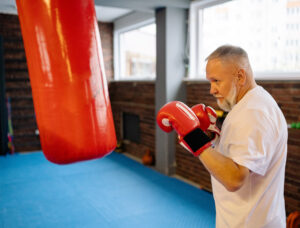We All Make Bad Lifestyle Choices
Click below if you prefer to listen to this blog as a Podcast:
No matter how bad your lifestyle choices are, it’s never too late to start healthy living, and you could gain a decade in the process – because there’s still a lot to live after 60, and with a few small but important changes, you can still make the best of it.
When we reach a certain age, it’s understandable to assume that our health will go in one direction, and it’s almost certainly not a positive one. The road to old age seems littered with misery and humiliation: heart disease, joint problems, cognitive problems. We seem to be inevitably slipping into “descent”.
But a growing body of research now shows that this is not necessarily the case. A major study by John Hopkins suggests that even in your sunset years, switching to a healthier diet can add a decade to your life.
Add Years to your Life – Even after 60!
A recent study from Johns Hopkins University in the United States tracked more than 6,000 people aged 44 to 84 for more than seven years. Those who have made positive changes, such as quitting smoking, following a Mediterranean diet, exercising regularly and maintaining a healthy weight reduced their risk of death by a spectacular 80 percent over this period.
In a new study, scientists at the University of Bergen in Norway have shown that by avoiding an “average” diet – one high in processed foods, especially red and processed meat – and instead having an “optimal” diet high in grains and legumes and nuts can add almost 10 years to your life at the age of 60. Even switching at age 80 can extend life expectancy by three years, the researchers found.
Even if you’ve always followed an unhealthy diet for most of your life low in vegetables, it may not be too late to make a change.
This new research follows a 2016 University of Glasgow study that found that eating too much red meat and not enough fruits and vegetables can increase the body’s “biological age” and contribute to health problems. Scientists found that moderate increases in serum phosphate levels in the body, caused by eating red meat and a poor overall diet, increase your biological age due to cellular damage.
How You Can Stay Biologically Young
It’s difficult to advise people exactly what to do in which decade [of life] since we differ so much in our backgrounds and overall health. But the truth is, you can surpass your chronological age by following behaviors that keep you biologically young.

People in their 40s and 50s should focus on building solid friendships because we don’t tend to meet new people later in life. For every year after age 60, you should exercise a little more than you did the year before. And try to limit your calories at any age – again more so than when you were younger.
Of course, all these principles also apply from the age of 60, even up to the age of 80 or over 90 years.
You can still Change At Age 90!
In fact, when we tell ourselves it’s too late to change, that’s absolutely when you need to start. Your body still has the ability to change and renew, even in your 60’s and 70’s – in fact even into your 90’s.
This new research agrees very well with what we have known from the five ‘blue’ areas of the planet for many years.
Scientists have long identified the healthiest places to live — Okinawa in Japan; Sardinia, Italy; Nicoya, Costa Rica; Icaria, Greece; and Loma Linda in California.
What these ‘blue’ areas have in common is a diet rich in fish, as they are all seaside. Residents also eat a lot of plant-based foods and have incorporated stress-relieving rituals into their day.
While we don’t have a choice about where we were born, the good news is that we can learn from the habits of the forever young: there are things you can do today to halt or even reverse the aging process.
Here are seven healthy tips you can do in your 60s and beyond to ensure you live longer:
-
Eat like the people of the Mediterranean
One of the best things we can do to live longer is to reduce or eliminate red and processed meat and follow a Mediterranean diet.
A multitude of studies confirm the health benefits of a Mediterranean diet of whole grains , fruits, vegetables, fish and shellfish, beans, nuts and olive oil without sugar or saturated foods.
-
Avoid red meat
Processed meats like sausage and bacon have been shown repeatedly to cause faster aging. Research from China suggests that these foods are the main causes of cardiovascular disease, cancer, respiratory diseases and neurodegenerative diseases.
An increase in total red and processed meat consumption by 3½ servings per week or more over an eight-year period is clearly associated with a 10 percent higher risk of death over the next eight years.
Processed meats can also disrupt sleep patterns because they contain high levels of tyramine, an amino acid that triggers the brain’s alertness.
However, eating oily fish like salmon, tuna, or sardines is said to help prevent dementia, prostate cancer, and age-related vision loss.
-
Eat less… and less often
Calorie restricted dieting means reducing the number of calories you eat in a 24 hour period.
A 2011 Newcastle University study led by Professor Roy Taylor set to revolutionize the treatment of type 2 diabetes after the landmark study showed the disease could be reversed with rapid weight loss.
Until Taylor’s research was published, type 2 diabetes was considered an incurable, lifelong disease: the patients in his study ate restrictively and subsequently many no longer required medication.
Eating all meals within an eight-hour window can also be helpful as it lowers blood sugar and reduces age-related inflammation.
A study on how postmenopausal women respond to time-restricted eating, published in the International Journal of Environmental Research and Public Health, showed that those who abstained from food for 16 hours, or from 8 p.m. to noon the following day, experienced a reduction in body weight (1.4 kg) and fat mass compared to the control group.
-
Feed your gut
Studies on the microbiome — the bacteria and other microbes that live in our gut — show it’s critical to our immune system, heart, and weight.
Research shows that it is possible to change the diversity of the gut microbiome within 72 hours of changing our diet, at any age.
Focus on a plate of highly colored foods: raspberries, grapes, and pickles like sauerkraut or kimchi.”
-
Reduce your alcohol consumption
It is very simple – if you cut back on your alcohol consumption, you’ll stay younger.
Too much alcohol disrupts your sleep and lowers your mood, but less alcohol also protects you from more chronic cell changes that can lead to cancer or affect your muscles and upset your balance.
However, there is no need to become totally abstinent. Health behavior studies have shown the benefits of moderate red wine consumption — no more than two glasses a day — and only in company. Never drink alone or you may end up consuming more.
First-stage alcoholic liver disease is completely reversible in just two weeks. Abstaining from alcohol for this period gives the liver time to recover, break down fat deposits, and stop inflammation—as long as you stick to medically approved guidelines of no more than 14 units per week spread over a few days, with two or three in a row alcohol-free days.
-
It’s never too late to get fitter
According to a 2019 study by the National Cancer Institute in the USA, getting active in midlife is just as good for you as it is if you start exercising at a young age. When it comes to reducing the risk of early death, physical activity at any age helps. But the benefits diminish once you stop exercising.
“If you maintain an active lifestyle or engage in any type of exercise during this window [from adolescence to middle age], you can increase your life expectancy,” says Dr. Pedro Saint-Maurice, lead author of the study from the Cancer Institute.
“If you’re not active and get into your 40s-50s and decide to get active, you can still enjoy many of these benefits.”
But the type of exercise is also important. Most people know the benefits of aerobic exercise, but resistance exercise (with weights) is even more important for keeping bones and muscles strong. Research from Australia and Nigeria has shown that spending just three seconds a day doing an “eccentric” bicep curl — slowly stretching a free weight below your waist — can lead to significant strength gains.
When it comes to aerobic exercise, aim for more than 150 minutes a week. Brisk walking is perfect, and never sit still for more than 45 minutes at a time.
-
Limit naps
As we age, our sleep patterns change. Our nights are restless, we sleep less and wake up earlier. So it’s not surprising that we feel the urge to take more naps.
It’s okay to nap for no more than 20 minutes, but never after 3 p.m. or it disrupts your circadian rhythm.
This will drain your energy and make you feel tired and much older. Sleep deprivation is fully reversible: have a good night’s sleep and your well-being will return.
With these excellent 7 tips you can extend your life.
In addition – you can also improve your quality of life.
A longer life of higher quality – who doesn’t want that.
Now it is up to you to make the best of it and take these suggestions to heart and follow them – or ignore them as you most likely will have done before.
It’s your choice.
You can no longer use ignorance as an excuse when you are too lazy or too sluggish to implement these ideas.
Because the facts clearly speak for themselves – there really is no need for persuasion, right?

Leave a Reply